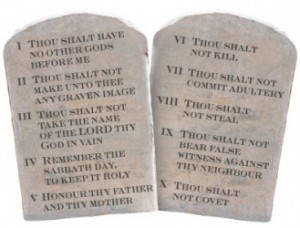 MONTGOMERY, Ala. — The Alabama Senate has advanced a bill that would place on the November ballot an initiative that would amend the state Constitution to expressly allow the Ten Commandments to be displayed in public buildings and schools.
MONTGOMERY, Ala. — The Alabama Senate has advanced a bill that would place on the November ballot an initiative that would amend the state Constitution to expressly allow the Ten Commandments to be displayed in public buildings and schools.
S.B. 181 was approved by an overwhelming vote of 23-3 on Tuesday, and now moves to the House for consideration. The proposal was presented by Sen. Gerald Dial, R-Lineville.
“Property belonging to the state may be used to display the Ten Commandments, and the right of a public school and public body to display the Ten Commandments on property owned or administrated by a public school or public body in this state is not restrained or abridged,” the bill reads in part. “The civil and political rights, privileges, and capacities of no person shall be diminished or enlarged on account of his or her religious belief.”
“The Ten Commandments shall be displayed in a manner that complies with constitutional requirements, including, but not limited to, being intermingled with historical or educational items, or both, in a larger display within or on property owned or administrated by a public school or public body,” it outlines.
Dial, 81, said that he believes that children might rethink harming their fellow students if they see God’s law before their eyes.
“I believe that if you had the Ten Commandments posted in a prominent place in school, it has the possibility to prohibit some student from taking action to kill other students,” Dial stated, according to the Alabama Political Reporter. “If this bill stops one school shooting in Alabama, just one, then it’s worth the time and effort we’re putting into it.”
However, some Democratic lawmakers asserted that the amendment would violate the Establishment Clause of the U.S. Constitution, which reads, “Congress shall make no law respecting an establishment of religion…”
“While I understand where you’re going, I just have a problem with wanting to put into the Constitution—when we have a right to freedom of religion in this state and in this country—one sect or a religion and not allow all others,” Sen. Bobby Singleton, D-Greenboro, remarked.
Sen. Linda Coleman-Madison, D-Birmingham, who professes to be a Christian, presented an amendment to Dial’s bill that would have allowed symbols or text from other religions to be displayed, but it was ultimately struck down.
Should the Alabama House of Representatives approve S.B. 181, the question will then be presented to voters in November.
As previously reported, John Adams, second president of the United States, wrote in his diary on Feb. 22, 1756, “Suppose a nation in some distant region, should take the Bible for their only law book, and every member should regulate his conduct by the precepts there exhibited. Every member would be obliged in conscience to temperance and frugality and industry, to justice and kindness and charity towards his fellow men, and to piety and love, and reverence towards almighty God.”
“In this Commonwealth, no man would impair his health by gluttony, drunkenness or lust—no man would sacrifice his most precious time to cards, or any other trifling and mean amusement—no man would steal or lie or any way defraud his neighbour, but would live in peace and goodwill with all men. No man would blaspheme his Maker or profane his worship, but a rational and manly, a sincere and unaffected piety and devotion, would reign in all hearts.”
“What a Eutopia, what a paradise would this region be,” Adams declared.
Become a Christian News Network Supporter...


